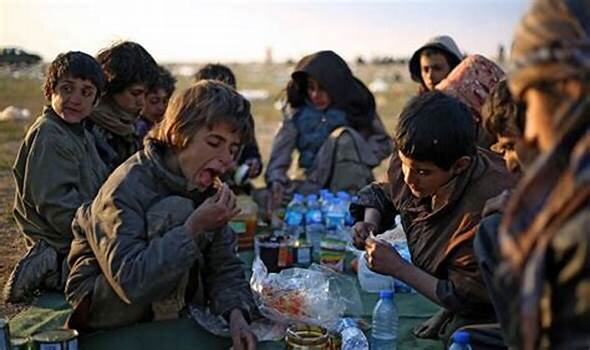More than 90% of Gaza facing ‘crisis levels’ of hunger: UN-backed report

A report published by the UN-backed Integrated Food Security Phase Classification (IPC) on Thursday says that the proportion of households facing crisis levels of hunger is the highest it has ever recorded globally.
“At least one in four households (more than half a million people) in the Gaza Strip are facing catastrophic acute food insecurity conditions (IPC Phase 5 – Catastrophe), characterized by extreme food gaps and collapse of their livelihood,” the report said. “About 80% of the population in [the] Gaza Strip are in Emergency (IPC Phase 4) or Catastrophe (IPC Phase 5).”
The report adds that there is a risk of famine in Gaza if the “current situation” continues.
“The only way to eliminate any risk of Famine is to stop the deterioration of health, nutrition, food security and mortality through the restoration of health and WASH [water, sanitation and hygiene] services, and the provision of safe, nutritious food to the whole population,” the report said. “The cessation of hostilities and the restoration of humanitarian space to deliver this multi-sectoral assistance and restore services are essential first steps in eliminating any risk of Famine.”
The humanitarian situation in Gaza has deteriorated rapidly since Israel began a major military operation on Oct. 7.
Trucks bringing aid from Egypt have delivered some food, water and medicine, but the United Nations says the quantity of food is just 10% of what is needed for the territory's inhabitants, most of whom have been displaced.
UN chief: ‘Life-saving aid’ remains ‘severely’ restricted in Gaza
UN Secretary-General Antonio Guterres said in a post on X that “intense fighting, lack of electricity, limited fuel and disrupted telecommunications” have “severely” restricted the UN’s efforts “to provide life-saving aid to Palestinians in Gaza”.
The UN chief added, “Conditions to allow for large-scale humanitarian operations need to be reestablished immediately.”
The statements by Guterres come as the UN Security Council again delayed voting on a resolution that is expected to include provisions aimed at getting more assistance into the besieged Palestinian enclave.
Will the US government listen to the world demands?
Meanwhile Agnes Callamard, the head of Amnesty International, asked the question in a brief post on X on Wednesday amid news that a UN Security Council vote on a new Gaza resolution was again postponed.
“Millions of people around the world have advocated for a ceasefire and are now waiting for the UN Security Council vote over humanitarian access to Gaza. Will the US government listen to the world demands? Or will it continue in its deadly inhuman course?” she wrote.
The council is now expected to consider the resolution on Thursday after several days of behind-the-scenes talks over its exact wording.
Diplomats say the negotiations have aimed to avoid a veto by the US, which has raised objections around the phrase “cessation of hostilities” in the original draft.
Practical mechanisms needed to document crimes in Gaza
Meanwhile analyst Tamer Qarmout has welcomed the UN call for an investigation into “unlawful killings” in Gaza after the reports that Israeli forces killed at least 11 unarmed Palestinian men in front of their families.
“However, we need actual tools,” he told Al Jazeera, noting that the key issue is how such probes are going to be conducted.
Referring to the International Criminal Court of Justice and General Prosecutor Karim Khan, Qarmout said: “They need to have some practical mechanisms on the ground to document these crimes. The war is still ongoing now, but at some point, it will stop, and someone has to investigate.”
The assistant professor at the Doha Institute for Graduate Studies also pointed out that none of the entities that could investigate alleged Israeli crimes against Palestinians are currently allowed into the Gaza Strip.
